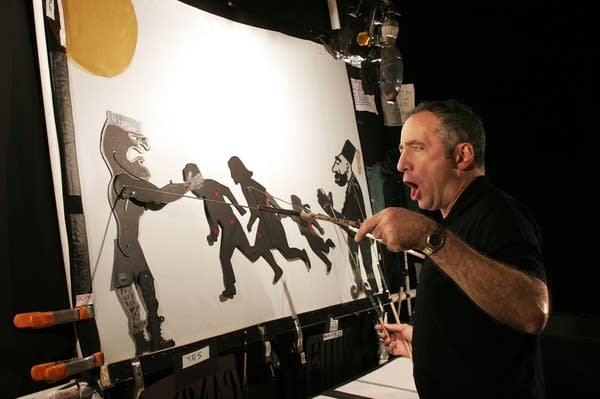Paul Zaloom's puppets may push your buttons
Go Deeper.
Create an account or log in to save stories.
Like this?
Thanks for liking this story! We have added it to a list of your favorite stories.

He's revered in the puppetry world, but Paul Zaloom has been feeling a little besieged lately. His show, "The Mother of All Enemies," takes sharp aim at hatred and xenophobia.
"This show's kind of a finger in the eye of whoever's saying that we're no good," he says.
By "we," Zaloom means people like himself and the main character of his show.
"We both identify ourselves as gay/secular humanist/Buddhist/agnostic/free-thinking knuckleheads," he says.
Turn Up Your Support
MPR News helps you turn down the noise and build shared understanding. Turn up your support for this public resource and keep trusted journalism accessible to all.
The Puppet Rampage Festival's artistic director, Nancy Smith, says Paul Zaloom's presence as a performer and workshop conductor has made the event a real draw this year. Smith thinks puppeteers are empowered by the bite of Zaloom's "button-pushing" satire.

"Once you do push a button you're forcing somebody to think, to question what they believe in: 'Why do I believe that and why did it push my button?' That puppetry can do that is a very exciting thing," she says.
Zaloom's puppet protagonist is named Karagoz. He's an Arab-immigrant artist who unwittingly becomes the subject of a manhunt wherever he goes. He's pursued by Al Qaeda, Israeli spies, Homeland Security and the Christian ex-gay movement.
Zaloom adapted the character from a figure in Turkish literature with a history dating back to the Ottoman Empire.
"Karagoz is an archetypical bad-boy puppet character in the mode of Punch, Caspar, Petrushka, Mickey Rourke, whatever," he says.
Karagoz is also the name of the centuries-old Greek and Turkish shadow puppet tradition that Zaloom employs in the play. The puppets are cut out of pressed board and mounted on hinged sticks, which he manipulates against a lit screen. He also supplies all the voices.
Zaloom is half-Arab. There may be convenient irony in his use of Middle Eastern puppetry techniques to skewer knee-jerk fear in post-9/11 America. But if that's why he chose the form, he's not admitting it.
In America we associate puppetry with children, but it's always been anti- establishment.
"I have been wanting to work my way through every puppet tradition that exists in the world and do my own sort of horrible bastardization, mutation, blasphemy, whatever on each one of them," he says.
In the Karagoz tradition, there's another prominent character named Hacivat. He's the companion of Karagoz. In Zaloom's show, Hacivat becomes Henry, Karagoz's boyfriend. When they're sent to jail in Syria because of their sexual orientation, a genie saves them and helps them escape, and the chase begins. While on the lam, the pair runs into an Al Qaeda summer camp.
"Hello Mother, hello Father," sings the Camp Al Qaeda counselor. "We are here at Camp Al Qaeda. Camp is very entertaining. We can't wait to start our terrorist training."
When they flee to Israel, government agents are on their trail. Somehow they make their way to United States--and Texas--where they're accosted by the Minutemen militia group patrolling the borders. They end up serving time at Guantanamo.
"Ohhh," groans Karagoz. "It's been rough in here. Yesterday, they flushed my secular humanist bible down the toilet--'The Best of Mad Magazine.' Oohhh."
Zaloom says Karagoz even meets the Statue of Liberty, but ends up having to run away from her too.
"He goes to an ex-gay-turn-homos-into-heteros-through-the-transforming- power-of-Jesus Christ-our-Lord-and-Savior summer dude ranch," Zaloom says.
"So he has quite an adventure."
"The Mother of All Enemies" is not a family show. There's a lot of blue humor and some people might find Zaloom's satire offensive. But he says that's in keeping with puppetry's traditional role as a thorn in the side of authorities, be they priests, kings, governors or presidents.

"In America we associate puppetry with children," he says. "But it's traditionally been anti-establishment, always been kind of a voice in the wilderness against the status quo."
Zaloom believes people are overwhelmed and frustrated by what's going on the world and he's trying to help them laugh about it. He quotes another one of his so called bad-boy heroes, the 50s-era American comedian Lord Buckley.
"He says it's the duty of the humor of any given nation in a time of high crisis to have people laugh at the things that are killing them, so they don't die before they actually get killed," he says.
Zaloom says he plans to continue performing his shadow puppet play in his home base of Los Angeles and on the road, hoping eventually to bring it to Israel.
Dear reader,
Political debates with family or friends can get heated. But what if there was a way to handle them better?
You can learn how to have civil political conversations with our new e-book!
Download our free e-book, Talking Sense: Have Hard Political Conversations, Better, and learn how to talk without the tension.




